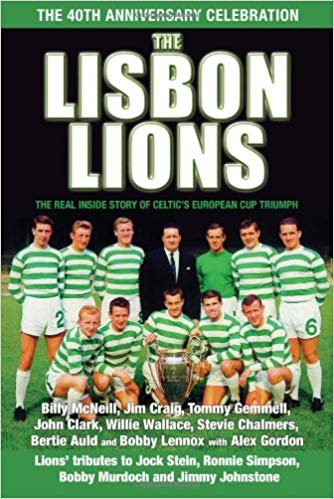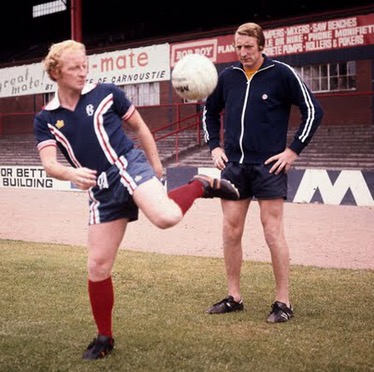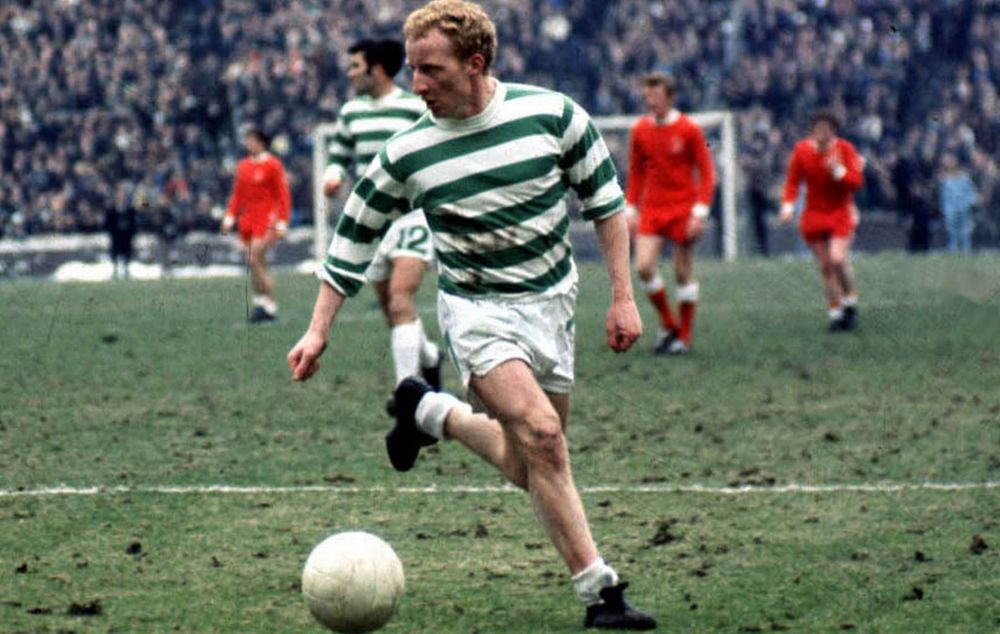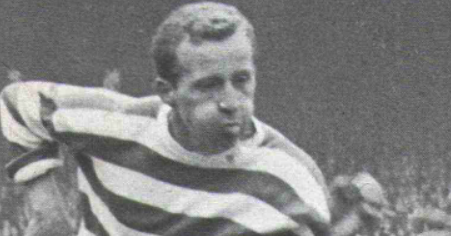JIMMY JOHNSTONE, the Greatest-Ever Celtic Player as voted by the Hoops supporters, was born on this day in 1944.
In another CQN EXCLUSIVE, author Alex Gordon takes a look through his book files for tales of the Hoops legend.
Alex devoted a chapter of his tribute book to the European Cup-winning team, ‘Lisbon Lions: The 40th Anniversary Celebration‘, to the colourful winger.
He interviewd all of the existing Lions at the time of publication in 2007. Here are their memories of a special team-mate.
Please enjoy.

BILLY McNEILL:
We are very fortunate there is so much wonderful footage of the Wee Man in action during his playing days. Film has captured all those marvellous images of Jinky doing what he did best, entertaining the fans. Those supporters were always so important to him.
He loved it when they sang: ‘Jimmy Johnstone on the wing’ and he would just keep playing away, ensuring they didn’t stop! When people who haven’t been fortunate enough to witness the Wee Man in the flesh see film of him playing they will understand why so many folk raved about him.
Jinky was a Celtic man through and through. He was a genuine working-class hero and I don’t think for a second he will mind me saying that. He was a Celtic fan who played for Celtic. He was one of the lads. Success and adulation never went to the Wee Man’s head.
Jinky played in an era where there were an awful lot of skilful players, talented individuals and colourful characters. But Jimmy Johnstone was the king of them all.
JIM CRAIG:
I still laugh at the memory of Jinky the morning after we had played Real Madrid at the Bernabeu Stadium in the Testimonial Match for Alfredo di Stefano. Jinky had arranged to go on holiday with his wife Agnes right after that game.
Jinky could do no wrong that night and I well remember a Real Madrid defender, Grosso, I think, came racing out of defence in an effort to clatter the Wee Man. He had had enough of Jinky’s one-man show and he was going to sort him out.
Yes, he did wallop Jimmy, but if he thought that was the end of Jinky’s meanderings that night he was so wrong. I recall him trotting back into defence, thinking to himself: “That takes care of that.”
His face was a picture, though, when he looked over his shoulder to see the Wee Man bouncing back to his feet to take the free-kick. I suppose he thought his opponent would fold under such treatment, but he didn’t know our Jimmy Johnstone.

The following day, Wee Jinky was in good form as he prepared to go on holiday. I helped him down with the suitcases and he and Agnes jumped into the waiting taxi. I had assumed he was going to the airport, but I heard him say: “Benidorm, driver!”
The taxi driver almost fainted. Possibly geography wasn’t one of Jinky’s strong points, but from Madrid to the holiday resort it was about 300 miles as the crow flies. Some hire!
I also recall a time when we were invited to play in some charity match in Iceland. There were two planes at the airport for the journey – the big one was an eight-seater! The other was a six-seater. Now, we all know Jinky wasn’t a big fan of flying. Anyway, we headed for these diminutive aircraft and Jinky was sitting up front in the six-seater. He didn’t look too comfortable and it didn’t get any better when the door to the cabin opened and out stepped the pilot.
Jinky looked up: “Are you the pilot?” he almost shreiked. “Yes,” came the reply. “Where’s the other pilot?” “There isn’t one.” Jinky looked aghast. “That’s all we bloody need. You’re the only pilot? What happens if you have a heart attack?” The pilot nonchalantly produced a booklet, handed it to Jinky and said: “There are the flying instructions – they’ll tell you all you need to know about flying a plane!”
I’m sure I heard the wee man praying all the way home.

TOMMY GEMMELL:
As Cairney says, it was well known that Jinky had a fear of flying and I know why. He was travelling back early from the States during the club’s summer tour in 1966 with right-back Ian Young. They were both due to get married and the club had allowed them to go ahead of the rest of the party.
Now, Wee Jinky may have been afraid of nothing on a football park where he often took some terrible punishment, but he really didn’t like getting up among the clouds. The journey back from the States seemed to have been fairly uneventful with everything going according to plan. I think they had already been flying for about an hour. Jinky and Ian were discussing where they would be going on honeymoon and so on. And then the plane lurched as it hit an air pocket.
Jinky would look you straight in the eye and say: “Tam, it must have fallen for about two minutes!” It must be said that the wee man was prone to a bit of exaggeration every now and again. “All I could see were all these dinners suspended about two feet above the heads of the other passengers.” There was no point in confiding in Jinky that if the plane had, indeed, dropped for about two minutes he may not have been around to tell the tale!
A smashing lad and missed by all.
JOHN CLARK:
I got to know Jinky fairly well during the early days because I was his unpaid chauffeur! I used to pick up Davie Hay in the mornings at Uddingston Cross and then we would make the short drive to Jinky’s place. The Wee Man could keep you waiting about 15 minutes while he got ready. I would be looking at my watch and wondering if he was going to keep us late and earn a rebuke from Big Jock.
Then out would step the bold lad and jump into the passenger seat beside me, with Davie sitting in the back. The first thing the Wee Man did when he got into the car was immediately switch off the radio! He never explained why. The next day I would turn up with Davie and say: “Watch this, the radio’s going off.”
Sure enough, Jinky would come in and immediately turn off the music. He never ever explained why he went through that routine, day after day. I guess he just wasn’t a morning person!
But what a player. He had the heart of a lion and it was a pleasure to play in the same team as him. I wouldn’t have fancied facing him, that’s for sure.

WILLIE WALLACE:
Jinky always said his heart was broken when he left Celtic in 1975. He didn’t see it coming, but changes had to be made and he moved on. He was never the same player after that. Celtic Park was, indeed, his spiritual home. That’s where he believed he belonged.
Tommy Gemmell and I had him for all of three months at Dundee. We threw him a lifeline because we thought he still had a lot to offer, but, for a variety of reasons, it didn’t work out. That was a great pity when you realise Jinky was only 32 at the time. He still had all the touches and trained exceptionally hard, but he struggled with the reality of no longer being Celtic’s No.7.
He was a very modest guy and I know he was surprised when the supporters voted him The Greatest-Ever Celtic Player. His family revealed he was convinced it would go to Henrik Larsson! That sums up the Wee Man.

STEVIE CHALMERS:
One of Jinky’s many great strengths was his ability to take the ball for a walk. He was invaluable when you were under pressure. You could give him the ball and he would simply hold onto it.
There was no way our opponents had a clue what he was going to do next because I’m pretty sure the Wee Man didn’t, either! However, once he had that ball no-one was going to get another touch until he was good and ready to part with it.
We could all step back and take a breather while Jinky when through his many routines. He was a marvellous guy to have in your team. He would have graced any side in the world.
BERTIE AULD:
Wee Jinky was so incredibly strong that he rarely sustained any kind of serious injury – and when you consider the amount of kickings he took that speaks volumes. Yes, the Wee Man enjoyed life, as we all did, but he never abused his body. He looked after himself, trained hard and I always thought he resembled the build of a light-middleweight boxer.
People often compared Jimmy to George Best as both were so skilful and born entertainers. But George had his injury problems while Jinky soldiered on. The Wee Man, Bestie and Denis Law were the type of players back then who played with flair and invited tackles from the opposition. Denis, too, had injuries and, of course, missed the European Cup Final in 1968 after undergoing a cartilage operation.

So, no matter what you might hear about Jimmy Johnstone, believe me he never cheated on the football pitch. I used to marvel at him later in his career. He actually developed into a different sort of player. Maybe he had lost a bit of his pace or trickery to get down that wing, but he became a lot more aware of what was happening all around the pitch. He was pinging long-range passes all over the place and, once again, he underlined what a fine player he was.
He may only have been 5ft 4in, but he had a superb leap on him, too. He scored a few with his head which left 6ft-plus defenders wondering where on earth he had materialised from. In a word, the Wee Man was majestic..
BOBBY LENNOX:
Jinks was the man. He had a special gift and he worked on that gift. He had all the talents in the world, but he also trained hard to make sure his fitness levels were high.
Stanley Matthews, the legendary Stoke City and England outside-right, and Real Madrid’s Alfredo di Stefano were two of his particular favourite players as he grew up. He bought a book by Matthews on how to play on the wing. He must have absorbed everything and added a few chapters of his own unique skills.
And it gave him great pleasure to be with the Celtic team that played in Di Stefano’s Testimonial Match shortly after we won the European Cup. The Wee Man was unbelievable that night. He always knew how to rise to the occasion.

